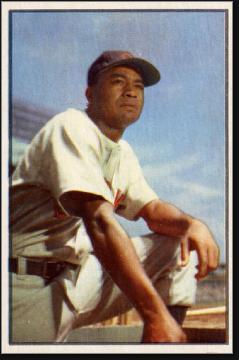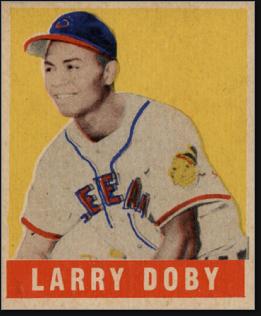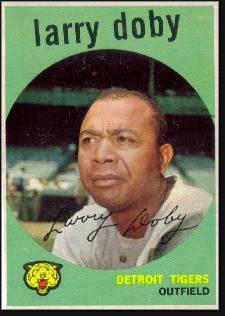
Larry Doby
Sport: Baseball
Born: December 13, 1923
Died: June 18, 2003
Town: Paterson
Lawrence Eugene Doby was born December 13, 1923 in Camden, South Carolina and grew up in Paterson from the age of 12. The Dobys were a prosperous family during Larry’s early childhood. His father, David, was in high demand as a groom and worked for wealthy stable owners in the northeast. In 1931, however, he drowned while fishing. Larry moved with his mother to New Jersey in 1936.
David Doby had been a talented semipro baseball player in his youth and Larry followed in his footsteps. He starred for the varsity at Paterson's Eastside High and also earned letters in track, football and basketball. Larry planned to become a coach or athletic director after graduation. In the meantime, he was able to earn a few dollars playing second base for the Newark Eagles under the name Larry Walker.
Larry enrolled at LIU hoping to play basketball for coach Clair Bee. As America’s involvement in World War II deepened, however, Larry decided he wanted to go into the military as an officer, so he transferred to Virginia Union College, which had a top ROTC program. However, he was drafted into the Navy after just a few months. He was assigned to Camp Robert Smalls, the segregated section of the Great Lakes Naval Training Station, north of Chicago. There he became a physical training instructor and was able to keep his ball-playing skills sharp. Near the end of the war Larry was transferred to the Pacific, where he became close friends with major leaguer Mickey Vernon.
 Upon his return to the states, Larry heard about the Dodgers’ signing of Jackie Robinson and decided to put his coaching career on hold while giving baseball a shot. He returned to the Eagles for the 1946 season hoping to catch the eye of big-league scouts. He also married his prewar sweetheart, Helyn. Newark went on to win the Negro League World Series and Larry recorded the final two outs at second base. Upon his return to the states, Larry heard about the Dodgers’ signing of Jackie Robinson and decided to put his coaching career on hold while giving baseball a shot. He returned to the Eagles for the 1946 season hoping to catch the eye of big-league scouts. He also married his prewar sweetheart, Helyn. Newark went on to win the Negro League World Series and Larry recorded the final two outs at second base.
Larry played the early part of 1947 for the Eagles before signing with the Cleveland Indians. On July 5, he became the first African American player in the American League. He played sparingly that year and endured the same hostility from fans, opponents and some teammates that Robinson did. In 1948, Larry won the starting center field job and helped the Indians win the pennant with 14 homers and 66 RBIs. He played the field well and developed a reputation for clutch hitting. That fall, in Cleveland’s victory over the Boston Braves in the World Series, he became the first African American to hit a postseason home run.
From 1949 to 1955, Larry was an All-Star. In the years between Joe DiMaggio’s decline and Mickey Mantle’s ascent, he was the league’s top all-around center fielder. In 1954, the Indians blew the league apart with 110 wins and Larry finished second in the MVP voting to Yogi Berra. He led the league with 32 homers and 126 RBIs. Larry had also won the home run crown in 1952 with 32. A disciplined hitter who liked to work deep into counts, he led the AL in strikeouts twice but was also among the league leaders in on-base percentage year after year.
As a defender, Larry was adept and coming in on line drives and short fly balls. This enabled him to play deeper than most center fielders. It also put him position to make some memorable grabs at the fence. His most famous came against the Senators in 1954 in Municipal Stadium. He speared a Tom Umphlett fly ball on the dead run as he leaped over the fence and onto the awning that shaded the bullpen. His right arm sliced right through the fabric. Larry fell back onto the field and held on for the out.
 After the 1955 season, the Indians went shopping for a shortstop. The White Sox had two good ones in young Luis Aparicio and veteran Chico Carrasquel. With Larry on the other side of 30, the Doby-for-Carrasquel deal looked like it would help both clubs. Larry held up his end of the bargain, turning in his 5th 100-RBI season. The 1957 season was Larry’s final one as an everyday player. Chicago traded him to the Orioles that winter, but the Indians reacquired him just before opening day. After the 1955 season, the Indians went shopping for a shortstop. The White Sox had two good ones in young Luis Aparicio and veteran Chico Carrasquel. With Larry on the other side of 30, the Doby-for-Carrasquel deal looked like it would help both clubs. Larry held up his end of the bargain, turning in his 5th 100-RBI season. The 1957 season was Larry’s final one as an everyday player. Chicago traded him to the Orioles that winter, but the Indians reacquired him just before opening day.
After spending 1958 with Cleveland, Larry split the 1959 campaign with the Tigers and White Sox. Although Chicago won the pennant in in 1959, Larry was not on the roster. He had been sent to Triple-A in late July and broke his ankle. Although he tried to come back for several seasons, Larry would never see another major league at bat. He finished his career with a .283 average and 253 homers and 970 RBIs in 1,533 games. Larry’s final season as a player was 1962. He appeared in 72 games for the Chunichi Dragons and at age 38 hit 10 home runs before retiring.
During the 1960s and 1970s, Larry divided his time between working in Newark and coaching for the Expos, Indians and White Sox. He owned a bar and liquor store in Newark and also worked for the Essex County prosecutor for a time. In 1978, he reached one of his longtime goals when he was hired to manage the White Sox. He was the second African American manager in major league history. It would be his first and last season at the helm. After taking over from Bob Lemon 10 weeks into the season he went 37–50 the rest of the way. He was relieved of his duties after the season.
Larry went to work for Major League Baseball, filling a number of roles. In 1997, the Indians celebrated the 50th anniversary of his first game. One year later, he was voted into the Hall of Fame. He passed away in Montclair in 2003 at the age of 79.
|